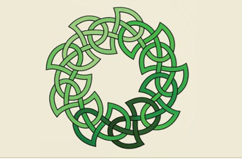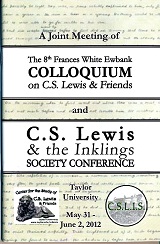Event Title
Academic Paper Session 4-B
Location
Rupp 205
Start Date
2-6-2012 9:30 AM
Description
"Whimsy and Wisdom: Fairyland as a Window to Reality in the Fiction of Chesterton and MacDonald" - Jessica D. Dooley
A comparison of how fairyland is employed in the fiction of G.K. Chesterton and George MacDonald, and the role fairyland plays in the personal development of their fictional characters, reveals parallels and important divergences between the two writers' philosophies. Their treatments of fairyland share the context of fixed moral standards that are clearly understood by fairyland's habitants and visitors, but disclose the authors' differing definitions of the relationship between personal responsibility and consequences. Fairyland, with its mysterious, imperative rules, and glorious generosity of rewards, provides a framework for explicating with startling clarity the dangerous immediacy of the consequences of moral choice. Chesterton and MacDonald's unique approaches to fairyland, its moral rules and its purpose, provide a window into their fundamental beliefs about reality, and the ultimate nature of the moral universe.
"Take away the supernatural, and what remains is the unnatural: The Secularizing Visions of G.K. Chesterton's Villains" - J. Cameron Moore
Chesterton claims in Heretics that denial of the supernatural leads ultimately to the unnatural, and much of his work explores the consequences of suppressing or ignoring the fundamental religious dimensions of the human person. Indeed many of Chesterton's villains spurn religion altogether in their pursuit of social progress. In this paper, I examine the antagonists in The Ball and the Cross, Manalive, and The Flying Inn in light of their rejection of the supernatural.
In their attempts to recreate themselves and their societies, Chesterton's villains demonstrate a clear link between secularization, the loss of human freedom, and the deathly disfiguring of the human psyche.
"Arguing for God: The Unarticulated Constituent and the Emergence of a Moral Grammar" - Finney Premkumar
G.K. Chesterton once stated "God is like the sun, you cannot look at it but without it you cannot look at anything else." Echoing similar sentiments C.S. Lewis declared, "I believe in Christianity as I believe that the sun has risen: not only because I see it, but because by it I see everything else." God, according to them, is in many ways the inexplicit or unarticulated reality from whom the more comprehensive of coherent aspects of life emerge. This paper will be a study in the common theoretical themes resident in two seminal works. Orthodoxy and Mere Christianity, authored by Chesterton and Lewis respectively. The first section will explore the idea of God as an unarticulated constituent of thought and experience in the reflections of the aforementioned thinkers. The second section will undertake to show how this unarticulated constituent becomes more explicit and articulated in the inevitable exemplification of a uniquely moral grammar in conversations. I will conclude by arguing that this method of correlation between the unarticulated and the articulated or the tacit and the explicit dimensions inevitably provides a very compelling contemporary apologetic approach.
Event Type
Paper
Link to Papers
Whimsy and Wisdom: Fairyland as a Window to Reality in the Fiction of Chesterton and MacDonald
Arguing for God: The Unarticlated Constituent and the Emergence of a Moral Grammar (Not available)
Academic Paper Session 4-B
Rupp 205
"Whimsy and Wisdom: Fairyland as a Window to Reality in the Fiction of Chesterton and MacDonald" - Jessica D. Dooley
A comparison of how fairyland is employed in the fiction of G.K. Chesterton and George MacDonald, and the role fairyland plays in the personal development of their fictional characters, reveals parallels and important divergences between the two writers' philosophies. Their treatments of fairyland share the context of fixed moral standards that are clearly understood by fairyland's habitants and visitors, but disclose the authors' differing definitions of the relationship between personal responsibility and consequences. Fairyland, with its mysterious, imperative rules, and glorious generosity of rewards, provides a framework for explicating with startling clarity the dangerous immediacy of the consequences of moral choice. Chesterton and MacDonald's unique approaches to fairyland, its moral rules and its purpose, provide a window into their fundamental beliefs about reality, and the ultimate nature of the moral universe.
"Take away the supernatural, and what remains is the unnatural: The Secularizing Visions of G.K. Chesterton's Villains" - J. Cameron Moore
Chesterton claims in Heretics that denial of the supernatural leads ultimately to the unnatural, and much of his work explores the consequences of suppressing or ignoring the fundamental religious dimensions of the human person. Indeed many of Chesterton's villains spurn religion altogether in their pursuit of social progress. In this paper, I examine the antagonists in The Ball and the Cross, Manalive, and The Flying Inn in light of their rejection of the supernatural.
In their attempts to recreate themselves and their societies, Chesterton's villains demonstrate a clear link between secularization, the loss of human freedom, and the deathly disfiguring of the human psyche.
"Arguing for God: The Unarticulated Constituent and the Emergence of a Moral Grammar" - Finney Premkumar
G.K. Chesterton once stated "God is like the sun, you cannot look at it but without it you cannot look at anything else." Echoing similar sentiments C.S. Lewis declared, "I believe in Christianity as I believe that the sun has risen: not only because I see it, but because by it I see everything else." God, according to them, is in many ways the inexplicit or unarticulated reality from whom the more comprehensive of coherent aspects of life emerge. This paper will be a study in the common theoretical themes resident in two seminal works. Orthodoxy and Mere Christianity, authored by Chesterton and Lewis respectively. The first section will explore the idea of God as an unarticulated constituent of thought and experience in the reflections of the aforementioned thinkers. The second section will undertake to show how this unarticulated constituent becomes more explicit and articulated in the inevitable exemplification of a uniquely moral grammar in conversations. I will conclude by arguing that this method of correlation between the unarticulated and the articulated or the tacit and the explicit dimensions inevitably provides a very compelling contemporary apologetic approach.


